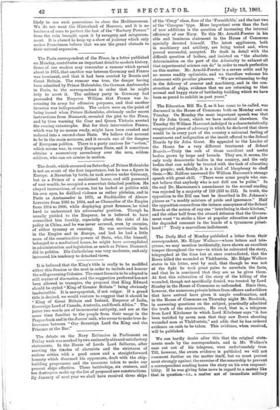The death, which occurred on Saturday, of Prince Hohenlohe is
not an event of the first importance, but he was a figure in The death, which occurred on Saturday, of Prince Hohenlohe is not an event of the first importance, but he was a figure in
Europe. A Bavarian by birth, he took service under Germany, but as a Prince of a mediatised house, and still possessed of vast wealth, he occupied a somewhat detached position. He obeyed instructions, of coarse, but he looked at politics with his own eyes, he disliked violence as rather plebeian, and in Paris as Ambassador in 1875, as Stadtholder of Alsace- Lorraine from 1885 to 1894, and as Chancellor of the Empire from 1894 to 1900, while displaying great firmness, he tried hard to understand his adversaries' position. Though he usually yielded to the Emperor, he is believed to have counselled him frankly, especially about the risks of his policy in China, and he was never accused, even by enemies, of either tyranny or cunning. He was serviceable both in the Empire and in Europe, and had he had a little more of the constructive powers of Stein, who, like himself, belonged to a mediatised house, he might have accomplished in administration and legislation as much as Prince Bismarck did in politics. His Catholicism was very moderate, and only increased his tendency to detached views.






































 Previous page
Previous page